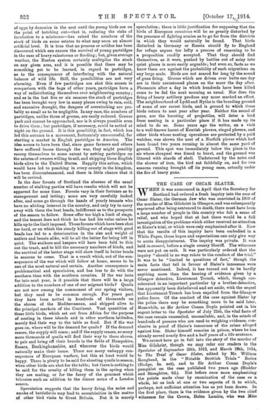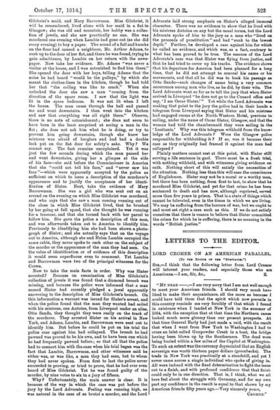THE CASE OF OSCAR SLATER.
WHEN it was announced in April that the Secretary for Scotland had ordered a fresh inquiry into the case of Oscar Slater, the German Jew who was convicted in 1909 of the murder of Miss Gilchrist in Glasgow, and was subsequently reprieved after being sentenced to death, there must have been a large number of people in this country who felt a sense of relief, and who hoped that at last there would be a full investigation of the problems which either received no attention at Slater's trial, or which were only emphasized after it. Now that the results of this inquiry have been embodied in a White Paper, those hopes and expectations can only give way to acute disappointment. The inquiry was private. It was held in camera, before a single county Sheriff. The witnesses were not put on oath. It was particularly ordered that the inquiry " should in no way relate to the conduct of the trial." It was to be " limited to questions of fact," though the main facts that tell in favour of Slater's innocence were never mentioned. Indeed, it has turned out to be hardly anything more than the hearing of evidence given by a Glasgow detective, Lieutenant Trench, which, though cor- roborated in an important particular by a brother-detective, has apparently been disbelieved and set aside, with the sequel that Lieutenant Trench has been expelled from the Glasgow police force. Of the conduct of the case against Slater by the police there may be something more to be said later. Meanwhile, as Sir Arthur Conan Doyle pointed out in his cogent letter to the Spectator of July 25th, the vital facts of the case remain unassaikd, unassailable, and, in the minds of hundreds of persons who are used to weighing evidence, con- clusive in proof of Slater's innocence of the crime alleged against him. Slater himself remains in prison, where he has already served nearly five and a half years of a life sentence. We cannot here go in full into the story of the murder of Miss Gilchrist, though we may refer our readers to the Spectator of September 28th, 1912, and March 28th, 1914, to The Trial of Oscar Slater, edited by Mr. William Roughead, in the " Notable Scottish Trials " Series (Hodge, 5s. net), and to Sir Arthur Conan Doyle's pamphlet on the case published two years ago (Hodder and Stoughton, 6d.). But before once more emphasizing the points made clear by examination of the case as a whole, let us look at one or two aspects of it to which, perhaps, not sufficient attention has as yet been drawn. In the first place, there is the evidence given by the two chief witnesses for the Crown, Helen Lambie, who was Miss
Gilchrist's maid, and Mary Barrowman. Miss Gilchrist, it will be remembered, lived alone with her maid in a flat in Glasgow; she was old and eccentric, her hobby was a collec- tion of jewels, and she saw practically no one. She was murdered one evening when Lambie had gone out (as she did every evening) to buy a paper. The sound of a fall and knocks on the floor had caused a neighbour, Mr. Arthur Adams, to rush up to the door of her flat, and there he was found, trying to gain admittance, by Lambie on her return with the news- paper. Now take her evidence. Mr. Adams "was never a visitor at the house, and I was astonished to find him there." She opened the door with her keys, telling Adams that the noise he had heard " would be the pulleys," by which she meant the clothes-lines in the kitchen, though he had told her that "the ceiling was like to crack." When she unlocked the door she saw a man "coming from the direction of the spare room. I saw that the light was lit in the spare bedroom. It was not lit when I left the house. The man came through the hall and passed me and went downstairs. I then went into the kitchen and saw that everything was all right there." Observe, there is no note of astonishment ; she does not seem to have been in the least surprised at seeing a man in the flat ; she does not ask him what he is doing, or try to prevent him going downstairs, though she knew her mistress was afraid of burglars and had had a double lock put on the flat door for safety's sake. Why P We cannot say. The fact remains unexplained. Yet it was just the few seconds during which the man passed her and went downstairs, giving her a glimpse at the side of his face—she said before the Commissioner in America that she "could not tell his face," and "never saw his face "—which were apparently accepted by the police as sufficient on which to issue a description of the murderer's appearance and to justify the acceptance of her identi- fication of Slater. Next, take the evidence of Mary Barrowman. She was a girl who was sent out on an errand on the evening on which Miss Gilchrist was murdered, and who says that she saw a man coming running out of the close in which Miss Gilchrist lived, that he brushed by her going at full speed, that she thought he was running for a tramcar, and that she turned back with her parcel to follow him. She gave the police a description of this man, and was afterwards taken out to America to identify him. Previously to identifying him she had been shown a photo- graph of Slater; and she actually says that on the voyage out to America, although she and Helen Lambie occupied the same cabin, they never spoke to each other on the subject of the murder or the appearance of the man they had seen. On the value of identification or of evidence of this description it would seem superfluous even to comment. Yet Lambie and Barrow man were two of the principal witnesses for the Crown.
Now to take the main facts in order. Why was Slater arrested ? Because on examination of Miss Gilchrist's collection of jewels it was found that a diamond brooch was missing, and because the police were informed that a man named Slater had recently pledged a jewel apparently answering to the description of Miss Gilchrist's brooch. On this information a warrant was issued for Slater's arrest, and when the police found that the man they wanted had sailed with his mistress, one Antoine, from Liverpool under an alias, Otto Sando, they thought they were really on the track of the murderer. They arrested Slater on his arrival in New York, and Adams, Lambie, and Barrowman were sent out to identify him. But before he could be put on his trial the police case against him had collapsed. The brooch he had pawned was proved to be his own, and to have been one which he had frequently pawned before ; so that all that the police had to connect him with the.case when his trial began was the fact that Lambie, Barrowman, and other witnesses said he either was, or was like, a man they had seen, but to whom they had never spoken. From first to last the police never succeeded in proving, or tried to prove, that he had ever even heard of Miss Gilchrist. Yet he was found guilty of the murder, by nine votes to six in a jury of fifteen.
Why P Unfortunately, the main answer is clear. It is because of the way in which the case was put before the jury by the Lord Advocate. Feeling was running high, as was natural in the case of so brutal a murder, and the Lord Advocate laid strong emphasis on Slater's alleged immoral character. There was no evidence to show that he lived with his mistress Antoine on any but the usual terms, but the Lord Advocate spoke of him to the jury as a man who "lived on the proceeds of prostitution" and had " sunk to the lowest depth." Further, he developed a case against him for which he called no evidence, and which was, as a fact, contrary to what has been proved to be true. The essence of the Lord Advocate's case was that Slater was flying from justice, and that he had tried to cover up his tracks. The evidence shows that his departure for America had been planned for a long time, that he did not attempt to conceal his name or his movements, and that all he did was to book his passage as Otto Sando—such changes of name being a very common occurrence among men who live, as he did, by their wits. The Lord Advocate went so far as to tell the jury that when Slater arrived in Liverpool " he does not go to the Cunard office and say, ' I am Oscar Slater.' " Yet while the Lord Advocate was making that point to the jury the police had in their hands a telegram from Liverpool saying that Slater and his mistress had engaged rooms at the North-Western Hotel, previous to sailing, under the name of Oscar Slater, Glasgow, and that the woman bad told the chambermaid they were sailing in the Lusitania.' Why was this telegram withheld from the know- ledge of the Lord Advocate P Were the Glasgow police responsible for withholding it P If so, was it because their case as they originally had framed it against the man had collapsed ?
Plainly matters cannot rest at this point, with Slater still serving a life sentence in gaol. There must be a fresh trial, with nothing withheld, and with witnesses giving evidence on oath. Nothing short of this will satisfy the necessities of the situation. Nothing less than this will ease the consciences of Englishmen. Slater may not be a moral or a worthy man, but there has been nothing, from first to last, to show that he murdered Miss Gilchrist, and yet for that crime he has been sentenced to death and has now, although reprieved, served more than five years in prison. That is a state of things which cannot be tolerated, even in the times in which we are living. We may be suffering from the horrors of war, but we ought to and must set right a case such as this. If we do not satisfy ourselves that there is reason to believe that Slater committed the crime for which he is suffering, there is no meaning in the words "British justice."



































 Previous page
Previous page